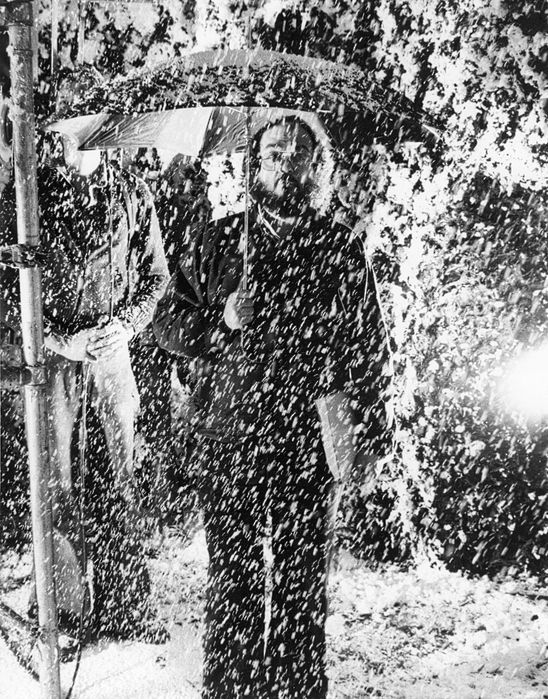PLANET FIRST TO REVIEW A WORLD PREMIERE: ‘JEWISH JESTER’ FALLS FLATTER THAN A NEBRASKAN PANCAKE
By DAN VALENTI
PLANET VALENTI Arts and Entertainment
“The Jewish Jester: A Fable with Music” — A Play Review
(FORTRESS OF SOLITUDE, SATURDAY, MAY 11, 2013) — To laugh has been likened to speaking in tongues. One does it in spite of oneself, if the laughter be true. The noise of the activity bears a certain similarity no matter who holy rolls with the Spirit or guffaws, and yet everyone does it in his own way and in situations that often seem perplexing.
Why did I laugh at this, yet he didn’t? ‘Tis a mystery, as anyone who has tried to explain why The Three Stooges and Monty Python are funny to someone who thinks these acts are, respectively, stupid and on drugs. The high-wire risk of attempting to be funny is that if they don’t “get’ the joke, no one will be able to explain it so they laugh.
Jester is a One-Trick Gag that Falls Flat
Also, consider these purported demographics on laughter, from Psychology Today, derived from brain studies and MRIs:
* Children laugh 400 times a day, on average. Adults can muster no more mirth than 15 chuckles per diem.
* Women laugh more than men
* Men get laughs more frequently than women.
* Laughter is a social function (we are more apt to laugh in groups than alone). These facts comes into play in the New Stage Performing Arts production of Daniel Klein‘s “The Jewish Jester: A Fable with Music,” which had its world premier Thursday (May 9) and runs through May 26 at the Berkshire Theatre Group‘s Unicorn Stage on the BFT main campus in Stockbridge.
This sparse (read: They had little to no money) production skimps on everything.
 That the jester is Jewish is Klein’s first and only joke, sadly, leaving the talented Jonathan Epstein as a joker who dies a thousand deaths. Epstein’s foil, the anti-semitic king played by a feeble, reedy Robert Lohbauer, fares no better. He’s literally and figuratively stuck in a cell awaiting doom with the jester, a captive audience who, like the audience cannot escape soon enough. Though both characters escape their prison, both die in the play.
That the jester is Jewish is Klein’s first and only joke, sadly, leaving the talented Jonathan Epstein as a joker who dies a thousand deaths. Epstein’s foil, the anti-semitic king played by a feeble, reedy Robert Lohbauer, fares no better. He’s literally and figuratively stuck in a cell awaiting doom with the jester, a captive audience who, like the audience cannot escape soon enough. Though both characters escape their prison, both die in the play.
Someone, Quick, Find the Yellow Pages for Jonny Epstein
Let’s dispense with the acting. Even the brilliant Epstein can’t do much with Klein’s one-trick-nag … er, gag. The jokes combine a smattering of Yiddish (an acquired linguistic taste if there ever was one, with all of its phlegm-like, throat-hawking sounds) and the cadences of Elizabethan English. Now keep in mind that Epstein could read out of the phone book and make it interesting, which led us to want to hand him the Yellow Pages. Klein’s fickle, capricious script does this wonderful actor a great disservice. The lines sound as harsh as a clown with his fake foot caught in a real bear trap. Even the pain must be forced.
Lohbauer’s king must do what we all do when someone who can’t tell a joke bungles the punch line: he fakes it. That’s what actors do all the time, but with a script this comically flat, it’s not an illusion a discerning audience member can buy. Complicating this is Lohbauer’s osteoporosic performance, made irritating by a whiny, high-pitched voice, a cheesy costume complete with a Burger King-like crown not meant to be satirical, and a tiredness that induces sleep in the audience. The saving grace of Lohbauer’s interpretation is that it provides reason and logic to the fact that, in the play, the king gets thrown into prison to await his execution. Those had to be some discerning subjects to want to kill this guy.
Director Bruce McDonald, made the most powerless of all in the company by Klein’s script, at least is spared the mercy of being seen. He can only leave the players to themselves to take their lumps on stage while he flees from the carnage. To their credit as consummate professionals, Epstein and Lohbauertake their beating with a certain class and grace.
“Car seat. Wastebasket. Guam.”
The play gets sporadic laughs, but only because this audience, paying $35 a ticket, must talk itself into laughing. It’s like visiting to Mass MoCa. When you pay a hefty admission fee to study a so-called “important” work of “Art” that resembles dog poop randomly scattered over a gym floor, you try hard to pretend to “get it” when you know all the time it’s crap. Also, as we noted above, in a social context, anything can get a laugh, provided it’s said the right (or wrong) way. If one or two people in a sardined crowd of 75 laugh, as happened at the Unicorn Friday night (May 10) others will follow.
If the right actor were to walk on stage and open a play by uttering “Car seat. Waste basket. Guam.” with the correct cadence and body language, some in an audience would laugh, albeit in a skittish manner. Your neighbors in the seats touching your perimeters secretly look to you and you to them. Someone laughs to break the tension. Soon, there are titters in the house. Playwrights, actors, and producers of comedy can also count on a theatrical truism: In the same way there’s ALWAYS a leather-lunged, beeeeeeeer-stoked heckler at every professional baseball game, in comic theater, there’s ALWAYS a couple of people who have to laugh loudly and inappropriately to mask the knowledge that they are in over their heads but must show that they, and they alone, “get it.”
The “Jester” marks only Klein’s second play. The works shows as much. The confidence Klein exhibits on the page with his books never makes it to the prison cell of “Jester,” where the fool and the king await their execution. They die, of course, but not in the way Klein intended. In the predictable plot, the Jewish jester and the anti-semetic king, brought to equality by their pending doom, find rapproachment. They team up, escape to a forest, and live happily ever after on a diet of marshmallows, mushrooms, peppers, and milk. So much for the contrived plot.
A comedy lives or dies on its gags, and the humor in “Jester” falls flatter than a steamrolled Nebraska pancake. There’s nothing else to save the play. Randall Parson‘s set and Jasmine Gage‘s props show they had about 78 cents with which to work. Andrew Kotarba’s lighting is practical but unimaginative. Photogenic guitarist Peter Pidgeon and clarinetist John Myers comprise the “orchestra.” These two talented musicians, the first looking like John Phillips from the Mamas and the Papas and the second like Pete Fountain, find themselves as shackled by Jesse Putnam‘s institutional “Hava Nagila” rip-offs as Epstein and Lohbauer are by Klein’s soporific writing.
Klein’s best line, delivered as only Epstein can, comes when the jester tells the king that jokes are a fool’s way of praying. As a would-be comedy, “The Jewish Jester” doesn’t have a prayer.
THE PLANET’s three-word review of this bust is: “You’re kidding, right?”
—– 00 —–
“The Jewish Jester: A Fable with Music”
By Daniel Klein
Presented by New Stage Performing Arts
Music by Jesse Putnam
Directed by Bruce T. MacDonald
Featuring Jonathan Epstein and Robert Lohbauer
at The Unicorn Theatre
May 9-May 26
Tickets: $35

















Dan,
Sounds like an evening of your life you can’t get back.
Did you take your wife? $70.00 down the drain?
There is a LENOX jester , Lenoxology
Thanks Greg, don’t let the door hit your azz,
My sister and her husband were there on Thursday night. They pretty much said the same. A waste of Mr. Epstein.
We attended The Jewish Jester on the same Friday that Mr. Valenti attended. Was he as the same play? We saw a well acted, well written, professional performance by all involved. Mr. Valenti’s viciousness as a critic recalls the work of smash mouth critic John Simon.
SS
Thank you for your comments. We take your comparison to John Simon as a compliment, since we have at this address long considered Simon one of our favorites. We wrote our first review back in 1975, in praise of guitarist Andres Segovia when he gave a concert in Syracuse, NY. Since then, we have reviewed countless films, plays, concerts, and art exhibits. This, plus our own standing as a writer and artist, qualifies our points. Back to John Simon: Richard Hornby wrote in the The Hudson Review, after Simon’s firing from NEW YORK magazine.
“His removal seems to have been political, with a new editor-in-chief acceding to the usual pressure from theatrical producers to replace him with someone more positive….In fact, Simon was no more negative than most critics, but his lively writing style meant that his gibes were more memorable than those of the others. His enthusiasms were expressed with the same vigor—after heaping praise on the writing, acting, directing, and even the set designs of Doubt, for example, he described it as “a theatrical experience it would be sinful to miss.” But positive reviews tend to be taken for granted, while negative ones are seen as personal insults. (I regularly get angry letters and e-mails of complaint from actors and theatre companies, but no one has ever thanked me for a favorable notice.) Theatrical producers in particular become enraged when reviews do not sound like one of their press releases. They finally seemed to have prevailed.”
In short, Simon, as does Valenti, functions nothing more than a critic. We cannot be fired since, on THE PLANET, we do not accept advertising. We are unbought and unbossed. We will call them as we see them.
That being said, we do, again, thank you for your opposing view.
um, Yiddish an “acquired linguistic taste?” Isn’t that mildly mocking Judaism and its history while reviewing a play about anti-semitism?
And along those lines, you probably shouldn’t try to mock a comedy that falls flat with jokes that fall flat.
A JEW
It is not mocking Judaism, mildly or otherwise. It is to state a fact. Yiddish is rougher on the ears than it is on the tongue. You may be interested to know that THE PLANET, your humble correspondent in this case, once did a stint as a joke writer for none other than Henny Youngman.
Let’s all give Mr. Epsteins Mothers a Happy Mothers Day shutout, what a brutal condemnation of a fine actor.
TITO
Notice that I did nothing but acknowledge the acting genius of Mr. Epstein. He was not served well, at all, by this play. The only thing “brutal” about “The Jewish Jester” was the script. After that point, no one involved in bringing this script to life had a chance.
Danny, it was a tongue in cheek comment and meant no disrespect for your review.
You weren’t the writer that came up with take my wife, please, we’re you?
T
Oh, how I wish! Actually, the story behind that line involves serendipity. Henny was doing a live radio show, subbing for Abbott & Costello. This was early on in his career. He began a joke with, “Take my wife …” and then he “went up,” as they say in theater. In other words, he forgot his lines. After a proper pause, he added ” … please.” It brought the house down and thus, a signature was born. I worked with Henny much later in his career, from 1977 through the early 80s. It was great fun and I got to meet a lot of people.
Talk about extremes hay Dan? working for Henny and your contributions on the Berkowitz saga, interesting indeed!